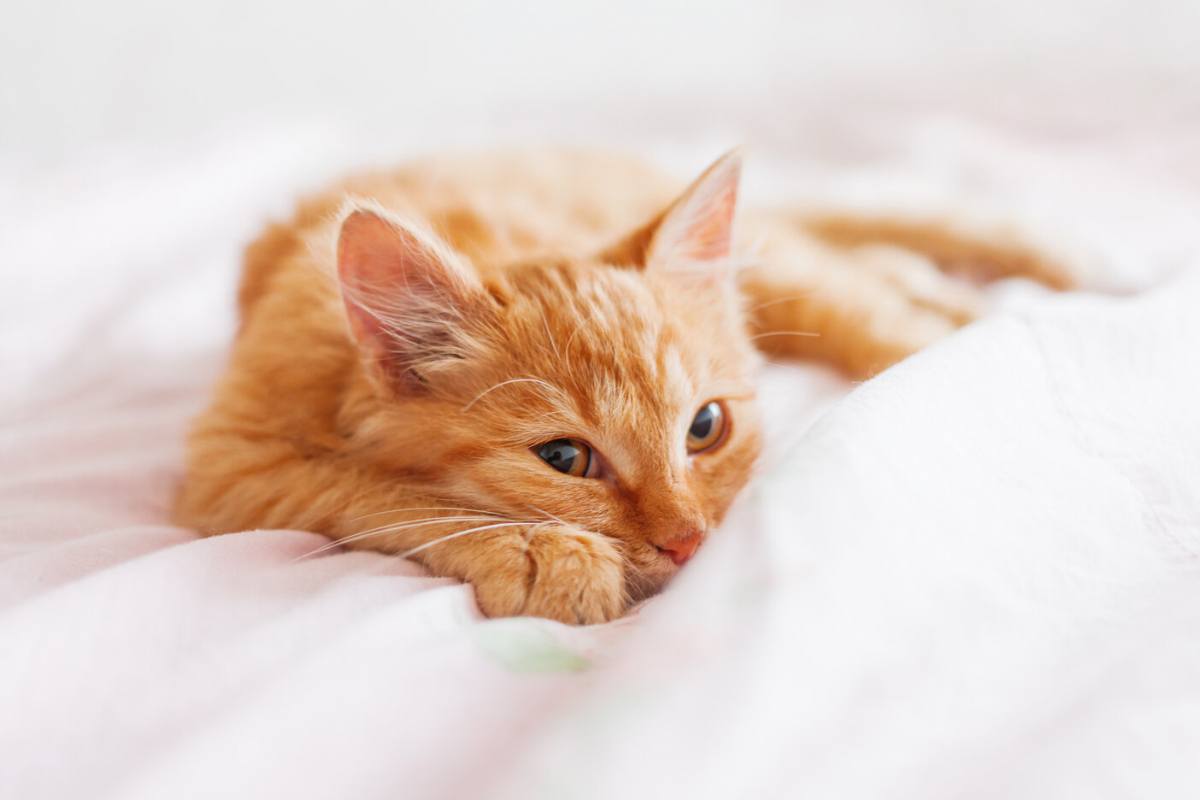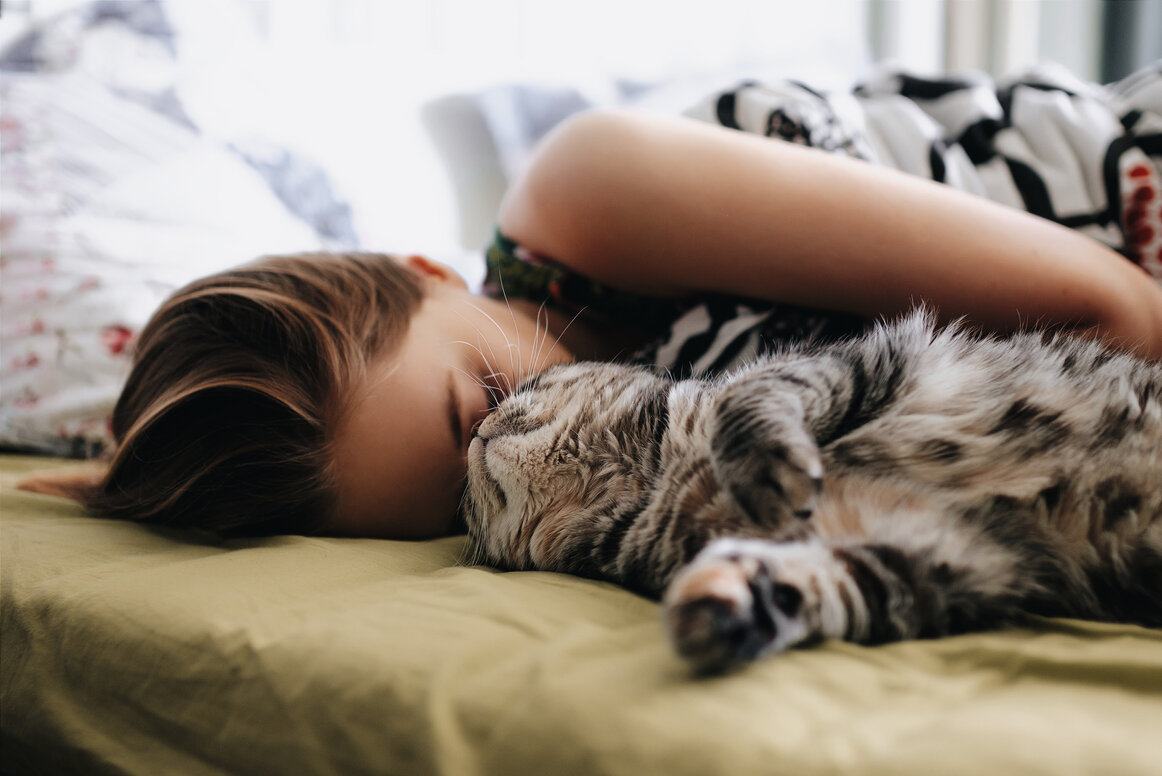
You’ve settled down for the night before falling into a deep sleep. Suddenly, you’re jolted awake by your beloved cat, hours before you are due to get out of bed. Perhaps they’ve done this by stomping across your bed or by making their voice heard loud and clear.
You ask yourself, half-asleep and frustrated: “Why does my cat keep doing this and is there any way to stop this behavior?” Read on to find out why your cat may interrupt your slumber and how to salvage your resting hours.
Why Does My Cat Wake Me Up?
1. Cats Have a Different Activity Pattern
First, it’s important to understand how a cat’s natural activity pattern differs from ours. People often assume cats are nocturnal. They are, in fact, “crepuscular’”animals. This means that their activity levels peak at dawn and dusk.
Unfortunately for us, this coincides with our sleeping time. But this doesn’t mean that we should sacrifice our sleep in order to live in harmony with cats. It has been shown that cats can adapt to our schedule and lifestyle. We will explore ways to do this later in the article.
2. They Are Bored and Seeking Attention
Being woken up by your cat at 3 a.m. can be an indicator that they are bored. It is commonly known that cats spend much of their time sleeping—up to 15 hours per day!
But if they are sleeping during the daytime when you are away from the house, then it is likely that they will be awake when you are trying to get some rest. Even if it is at an inappropriate time, they will look for some sort of interaction with you if they haven’t been getting enough stimulation.
3. They Are Hungry

When cats wake up at night or early in the morning, one of the first things on their mind is food.
Cats tend to favor eating small and frequent meals throughout the day. Think about cats in the wild: they hunt small prey, such as rodents and birds, in short bursts in between periods of rest to recover their energy. Cats usually hunt more at dawn and dusk when their prey is up and about.
So how does this relate to your domestic cat? With these natural instincts and behaviors in mind, it is likely the case that your cat is giving you a wakeup call because they are feeling peckish. Their hope is that you will climb out of bed and offer them some food.
4. They Have Been Rewarded for It Previously
Cats respond to “positive reinforcement.” This is a training method that involves rewarding good behaviors. The idea is that they learn to associate the behavior with the reward and are then more likely to repeat the behavior.
However, we can also unintentionally reward undesirable behaviors. Have you been woken up by your cat in the past and indulged in them, even if it’s just to try and stop them from disturbing you? All it can take is a stroke or a cuddle or an offering of treats to encourage them to continue this behavior. They are taught that they will get what they want in the end.
5. They Are Ill or Feeling Sick
As you will now know, there are various behavioral reasons that help explain why your cat might be interrupting your sleep. It’s important not to forget about underlying medical conditions that can cause changes in sleeping patterns, especially in older cats.
These include hyperthyroidism (overactive thyroid gland), high blood pressure, and cognitive dysfunction syndrome. It can also indicate pain or discomfort. If waking you up is a recent behavioral change, look out for other unusual signs, especially if your cat is older. Consider consulting your veterinarian to rule out any health issues.
How Can I Stop My Cat From Waking Me Up?
Establish a Good Routine Before Bedtime

Establishing a routine of hunting, eating, and grooming, then sleep, can lead to better nights.
In the wild, cats will hunt, eat, groom, and then sleep. You can establish a copy of this routine with your own cat, which is a fantastic way for them to express their natural behaviors. Use toys, such as a cat wand, to motivate your cat to stalk, run, and pounce.
This mimics their hunting sequence as if chasing after small prey. Ten to 15 minutes of a play session should be sufficient. Once you feel they’ve had a good chance to burn off some of their energy, give them a meal. After their belly has been filled and their appetite satisfied, your cat should feel more inclined to wind down for bedtime.
Use an Automatic Feeder
Using an automatic feeder is a great way to give your cat another feed during the nighttime. These feeders dispense a specific amount of food at a time that you control. This eliminates the need for you to get up when your cat comes calling at 4 a.m. and avoids any inadvertent reinforcing of your cat’s behavior.
You can set the timer to release food around dawn, or whenever your cat seems to wake you up. The automatic feeder can also be used to try and train your cat to expect food at a later time. To do this, slowly delay the time at which food is released every few days. If your cat begins to wake you up again, revert to the previous time and try again in a couple of days.
Provide Plenty of Enrichment
Cats require both mental and physical stimulation. This is even more essential for cats who are kept indoors, without access to the outside world. As discussed earlier, a bored cat will feel the need to disrupt your sleep schedule.
Make sure you provide your cat with plenty of enrichment day and night. Not only should you initiate a play session before bed, but make sure you do so a few times during the day as well.
The use of interactive toys helps tire out your cat and mimics how they would hunt in short bursts in the wild. Being able to express their natural behaviors prevents boredom from setting in. The social interaction also helps to strengthen the bond they have with you.
Leave toys and puzzles out for your cat. Rotate the toys that you offer so that your cat doesn’t get bored of them. Puzzle feeders require your cat to problem solve and work for their food. The occasional catnip can stimulate positive feelings. Cat trees, perches, and scratching posts can also keep your cat entertained and fulfilled.
Ignore Their Behavior

Any response from you, even a negative response, can reinforce the behavior.
Carrying out the above steps will not bring about immediate change. Your cat might initially continue to wake you up during the night. Do not be tempted to respond to them, even if you want to tell them off, as this will only encourage them further.
Instead, consider investing in some earplugs and pretending to be asleep. What you want to achieve is to teach your cat that their disruptive nighttime behavior will not result in any attention or food from you.
Final Thoughts
Now you have a better understanding of a cat’s natural activity pattern and the behavioral reasons behind your cat acting as an early alarm clock. As tempting as it might be to clamber out of bed and offer them some food or attention, this can make your problem worse.
Simply ignoring the problem without making any adjustments won’t fix anything either. Instead, offer your cat plenty of enrichment and entertainment so that they are ready for bed when you are. With patience and perseverance, you can aspire to have a good night’s sleep once again.
Also Read: Why Does My Cat Lay And Sleep Between My Legs?
-
Atkinson, T. (2018). Practical Feline Behaviour. Oxfordshire, UK: CAB International.
-
Piccione, G., Marafioti, S., Giannetto, C., Panzera, M., & Fazio, F. (2013). Daily rhythm of total activity pattern in domestic cats (Felis silvestris catus) maintained in two different housing conditions. Journal Of Veterinary Behavior, 8(4), 189-194. doi: 10.1016/j.jveb.2012.09.004







